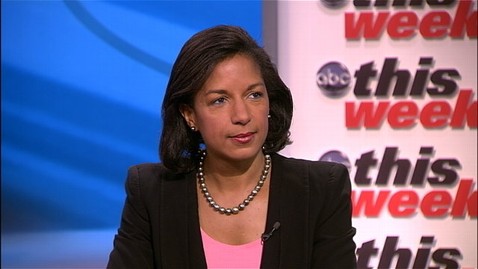Ambassador Susan Rice: Libya Attack Not Premeditated

ABC
U.S. Ambassador to the United Nations Susan Rice said the attack on the American consulate in Benghazi last week was not premeditated, directly contradicting top Libyan officials who say the attack was planned in advance.
"Our current best assessment, based on the information that we have at present, is that, in fact, what this began as, it was a spontaneous - not a premeditated - response to what had transpired in Cairo," Rice told me this morning on "This Week."
"In Cairo, as you know, a few hours earlier, there was a violent protest that was undertaken in reaction to this very offensive video that was disseminated," Rice said, referring to protests in Egypt Tuesday over a film that depicts the Prophet Muhammad as a fraud. Protesters in Cairo breached the walls of the U.S. Embassy, tearing apart an American flag.
"We believe that folks in Benghazi, a small number of people came to the embassy to - or to the consulate, rather, to replicate the sort of challenge that was posed in Cairo," Rice said. "And then as that unfolded, it seems to have been hijacked, let us say, by some individual clusters of extremists who came with heavier weapons… And it then evolved from there."
Ambassador Christopher Stevens, along with three other Americans, were killed in Libya following the assault on the American consulate in Benghazi, on the 11 th anniversary of the Sept. 11 attacks. Rice said the FBI is examining the attack, saying their investigation "will tell us with certainty what transpired."
Rice's account directly contradicts that of Libyan President Mohamed Yousef El-Magariaf, who said this weekend that he had "no doubt" the attack was pre-planned by individuals from outside Libya.
"It was planned, definitely, it was planned by foreigners, by people who entered the country a few months ago, and they were planning this criminal act since their arrival," Magariaf told CBS News.
Unlike other embassies around the world, Rice said there were no Marines present last week to protect the consulate in Benghazi, or the main U.S. embassy in Tripoli, saying the U.S. presence there is "relatively new" since the revolution that overthrew former dictator Moammar Gadhafi.
"There are not Marines in every facility. That depends on the circumstances. That depends on the requirements," Rice said. "Our presence in Tripoli, as in Benghazi, is relatively new, as you will recall. We've been back post-revolution only for a matter of months."
But Rice said there was a "substantial security presence" at the consulate in Benghazi, noting that two of the four Americans killed there were providing security.
"We certainly are aware that Libya is a place where there have been increasingly some violent incidents," Rice said. "The security personnel that the State Department thought were required were in place… It obviously didn't prove sufficient to the - the nature of the attack and sufficient in that - in that moment."
"But the president has been very clear. The protection of American personnel and facilities is and will remain our top priority," Rice added. "That's why we've reinforced our presence in Tripoli and elsewhere."
View the full interview here:
Like "This Week" on Facebook here. You can also follow the show on Twitter here.